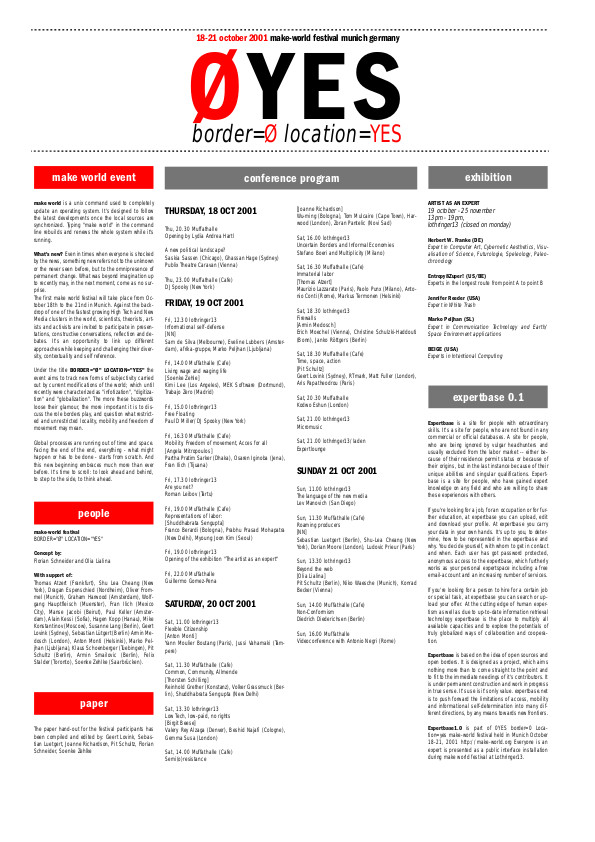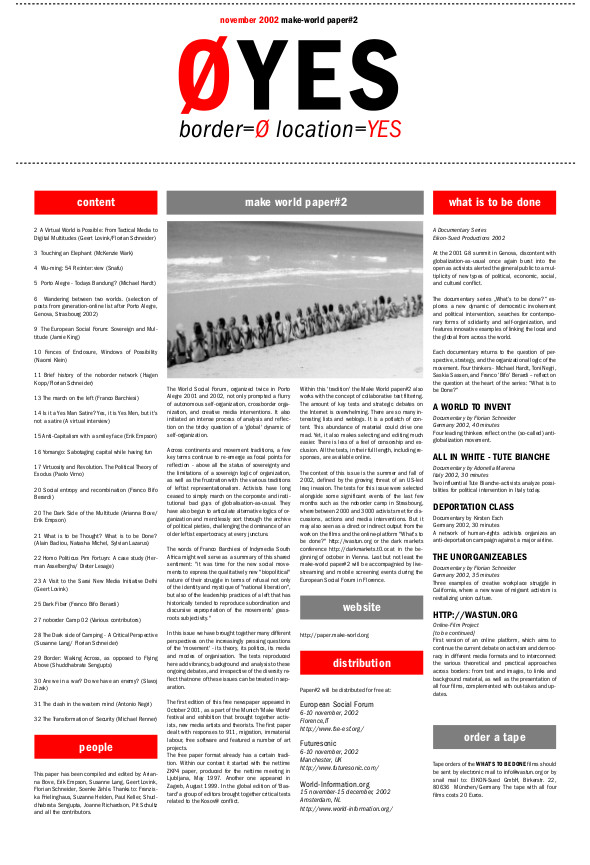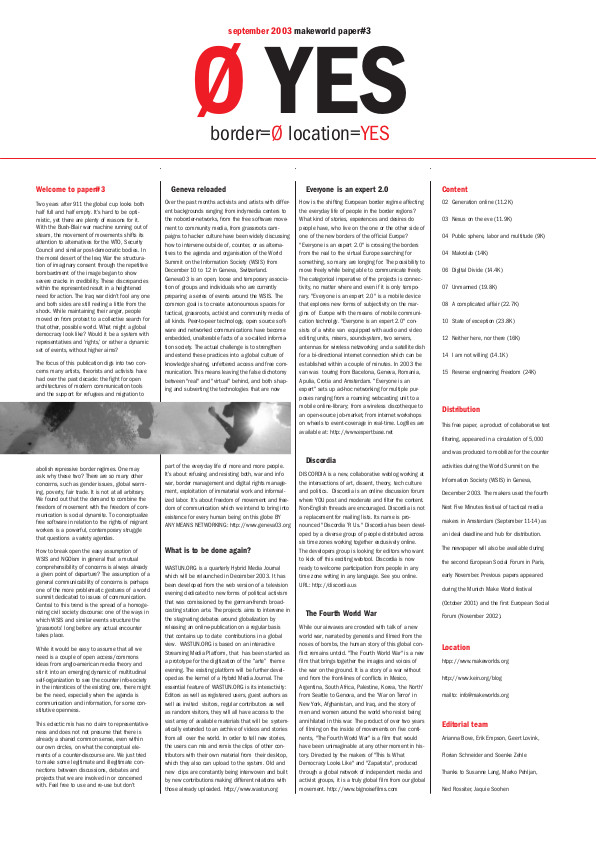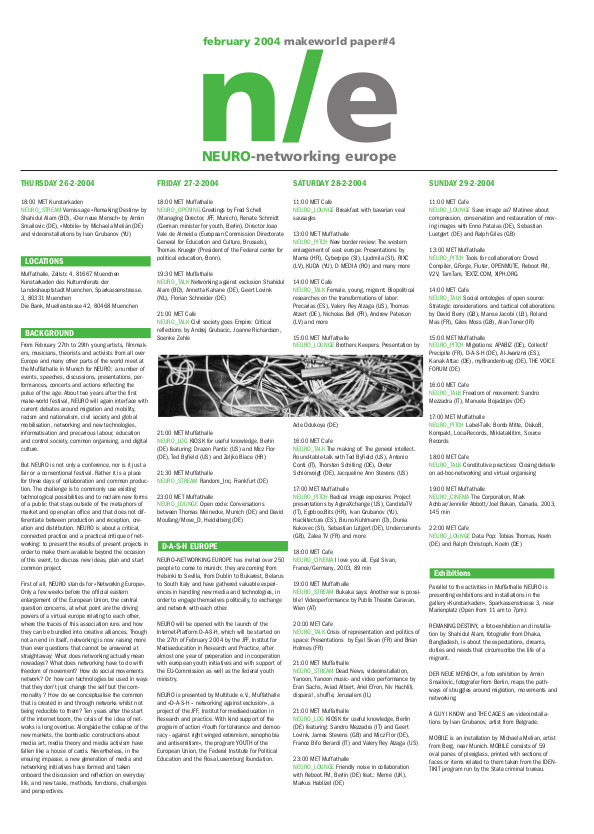Jonathan Zittrain: The Future of the Internet. And How to Stop It (2008)
Filed under book | Tags: · copyright, internet, netizens, networks, web 2.0

This extraordinary book explains the engine that has catapulted the Internet from backwater to ubiquity—and reveals that it is sputtering precisely because of its runaway success. With the unwitting help of its users, the generative Internet is on a path to a lockdown, ending its cycle of innovation—and facilitating unsettling new kinds of control.
IPods, iPhones, Xboxes, and TiVos represent the first wave of Internet-centered products that can’t be easily modified by anyone except their vendors or selected partners. These “tethered appliances” have already been used in remarkable but little-known ways: car GPS systems have been reconfigured at the demand of law enforcement to eavesdrop on the occupants at all times, and digital video recorders have been ordered to self-destruct thanks to a lawsuit against the manufacturer thousands of miles away. New Web 2.0 platforms like Google mash-ups and Facebook are rightly touted—but their applications can be similarly monitored and eliminated from a central source. As tethered appliances and applications eclipse the PC, the very nature of the Internet—its “generativity,” or innovative character—is at risk.
The Internet’s current trajectory is one of lost opportunity. Its salvation, Zittrain argues, lies in the hands of its millions of users. Drawing on generative technologies like Wikipedia that have so far survived their own successes, this book shows how to develop new technologies and social structures that allow users to work creatively and collaboratively, participate in solutions, and become true “netizens.”
Published by: Yale University Press, 2008
Creative Commons Attribution Non-Commercial Share-Alike 3.0 license
ISBN 0300124872, 9780300124873
352 pages
PDF (updated on 2013-6-5)
Comment (1)Makeworlds papers 1-4 (2001-2004)
Filed under magazine | Tags: · activism, civil society, globalisation, human rights, information society, networks

make world is a unix command used to completely update an operating system. It’s designed to follow the latest developments once the local sources are synchronized. Typing “make world” in the command line rebuilds and renews the whole system while it’s running. The first make-world festival took place from October 18th to the 21nd, 2001 in Munich. Against the backdrop of one of the fastest growing High Tech and New Media clusters in the world, scientists, theorists, artists and activists were invited to participate in presentations, constructive conversations, reflection and debates. It was an opportunity to link up different approaches while keeping and challenging their diversity, contextuality and self reference.
Under the title BORDER=”0″ LOCATION=”YES” the make world paper#1 aimed to track new forms of subjectivity carried out by current modifications of the world; which until recently were characterized as “infotization”, “digitization” and “globalization”. The more these buzzwords loose their glamour, the more important it is to discuss the role borders play, and question what restricted and unrestricted locality, mobility and freedom of movement may mean.
Compiled and edited by Geert Lovink, Sebastian Luetgert, Joanne Richardson, Pit Schultz, Florian Schneider, Soenke Zehlke
32 pages
PDF (updated on 2013-8-10)

One year after the make-world conference, paper#2 has been released at the occasion of the European Social Forum in Florence in the beginning of November 2002.
Compiled and edited by Arianna Bove, Erik Empson, Susanne Lang, Geert Lovink, Florian Schneider, Soenke Zehlke
32 pages
PDF (updated on 2013-8-10)

Make world paper3 has been published on 11 September 2003. It is the third edition of a free newspaper that is distributed in 5,000 copies. Paper3 is geared towards the World Summit on the Information Society in Geneva, in December 2003.
Edited by Arianna Bove, Erik Empson, Geert Lovink, Florian Schneider, Soenke Zehlke
16 pages
PDF (updated on 2013-8-10)

Makeworlds paper#4 is a product of collaborative text filtering and appeared in a circulation of 10,000 hard copies on dead tree. It was produced as a collection of associated or complementary or auxiliary text material at the occasion of NEURO–networking europe, from February 26-29, 2004 in Munich (DE). But also beyond the actual event the paper will be valuable as a entry point to the various debates, presentations, workshops and audio-visual productions during and around the festival.
Edited by Arianna Bove, Annett Busch, Erik Empson, Susanna Lang, Geert Lovink, Sebastian Luetgert, Florian Schneider, Mathias Wrba, Soenke Zehlke
Publisher Multitude, Bernau b. Berlin
32 pages
PDF (updated on 2013-8-10)
Comment (0)Tiziana Terranova: Network Culture: Politics for the Information Age (2004)
Filed under book | Tags: · arpanet, cellular automata, digital economy, entropy, gift economy, information theory, internet, network culture, networks, organization, politics

“In an age of email lists and discussion groups, e-zines and weblogs, bringing together users, consumers, workers and activists from around the globe, what kinds of political subjectivity are emerging? What kinds of politics become possible in a time of information overload and media saturation? What structures of power and control operate over a self-organising system like the internet?
In this highly original new work, Tiziana Terranova investigates the political dimension of the network culture in which we now live, and explores what the new forms of communication and organisation might mean for our understanding of power and politics. Terranova engages with key concepts and debates in cultural theory and cultural politics, using examples from media culture, computing, network dynamics, and internet activism within the anti-capitalist and anti-war movements.
Network Culture concludes that the nonlinear network dynamics that link different modes of communication at different levels (from local radio to satellite television, from the national press to the internet, from broadcasting to rumours and conspiracy theories) provide the conditions within which another politics can emerge. This other politics, the book suggests, does not entail the production of a new political discourse or ideology, but the invention of micropolitical tactics able to stand up to new forms of social control.”
Published by Pluto Press, 2004
ISBN 0745317499, 9780745317496
208 pages
Reviews: Wright (Mute, 2005), Zeffiro (Canadian Journal of Communication, 2006), Jackson (Participations, 2008), Wark (Public Seminar, 2015).
PDF (updated on 2017-10-14)
Comment (1)
